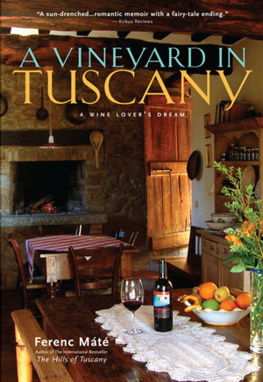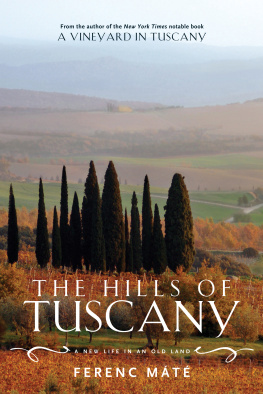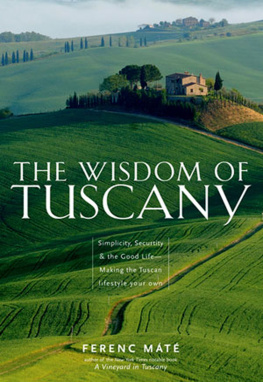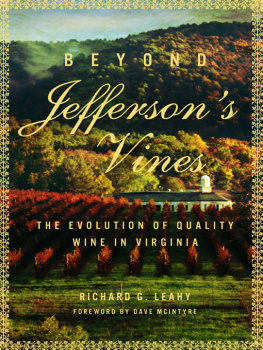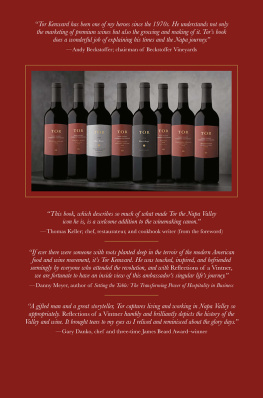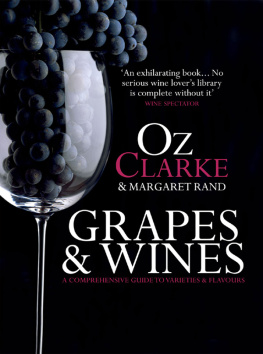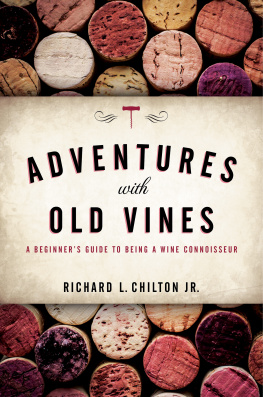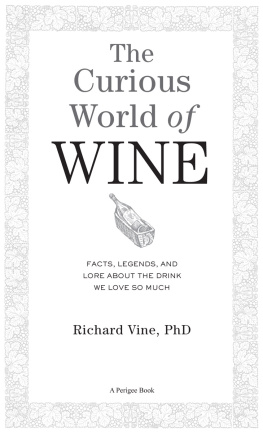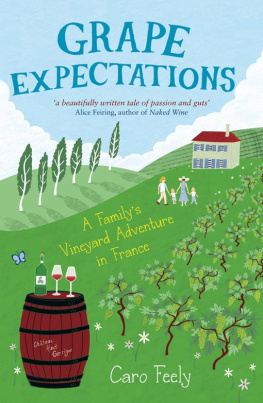W. W. NORTON NEW YORK LONDON
All rights reserved.
W. W. Norton & Company Ltd., Castle House, 75/76 Wells Street, London W1T 3QT
1 ~ THE SODDISFAZIONE
P aolucci and I sat on his worn stone steps, bread and prosciutto in one hand, a glass of red wine in the otherit was an hour before lunchand looked between the cypresses, across the valley to the hill town of Montepulciano. The bells swung in the steeple and filled the noonday with their song. Rosanna came out of the vineyard, perspiring in the heat, and put her hoe, headfirst, into a bucket of water to keep the wood from drying. With her sleeve, she wiped the sweat from her eyes, and then went into the kitchen to stir the simmering wild boar in umido .
Dont worry, Rosa, Paolucci said. When I win the lottery, things will be different.
Ill have a new hoe handle? Rosanna taunted.
Therell be no more hoes! Paolucci retorted. No hoeing and no pruning, and no more tying the maledetti vines. No more worry about fungus and mildew, or too much rain or drought. Youll just take it easy and Ill just drink more wine.
More than now? asked Rosanna. Youll have to do it in your sleep.
Paolucci drank. I pray to God theres no afterlife, he grumbled. If there is, shell bust my balls until the end of time.
He refilled our glasses. You dont want a vineyard, Francesco, he said. You dont want a wife either but its too late for thatbut its not too late to not get a vineyard. A vineyard is like a grave; the dead man in it can never leave the ground.
But the soddisfazione ? I asked.
Heres the soddisfazione ! he said, holding up his glass. Ill give you all the soddisfazione you can drink. Why ruin your life?
He might as well have been talking to the stones.
As I walked home after lunch, all I could think of was having my own vines.
Our house sat below the ridge, a quarter mile down the dusty road from Paoluccis. It was called La Marinaia, the sailors wife, and why it had that name sixty miles from the sea God only knowsthe neighbors certainly didnt, and not a single one of them lost sleep over it.
The house had been restored a few years back with heavy oak beams in the ceilings and hand-made terracotta floors. The ground flooronce stableswas now a long entrance with plenty of room for books, a pantry a few steps down, and a kitchen opposite with a fireplace and glass doors to the garden. The dining room was fit for royal declarations and the living room had a fireplace big enough to roast the village sow. Upstairs were three bedrooms with views of Montepulciano to break an opera-set designers heart.
The surrounding gardens had been a Pharaonic task for the previous owner, a financier. The hills around Montepulciano are mostly clay, so good dirt had to be imported for the cypresses, laurel, lavender, and rosemary. The financier shrewdly planted a grove of walnuts to be sold in twenty years for high-class lumber to pad his coffers, but in the hard clay they barely grew, and werent even fit for toothpicks when he died.
Though the house sat in an ocean of fields and vines, only two acres belonged to us, and on it we planted the essential: fifty man-height olives.
To own a vineyard I would have to buy more land.
I walked past Paoluccis vines, past the reedy pond where wild ducks nested, and past the Talosa vineyard that almost touched our house. A loud-mouthed Roman ran it. Over the years he had swindled every neighbor out of something, and I had once heard the banker across the creek yell after him, youre lucky this isnt Sicily, because then you would be dead!
I stared at the rows of vines curving down the hill, the young buds swelling on pruned stalks, and the freshly furrowed ground awaiting rain. I dreamt of my own vineyard, full of the bustle of vendemmia , the grape harvest, interrupted at noon for great meals at long tables under the bowers before walking back into the vineyards, tipsy and smiling, the shears now cutting the grappoli twice as fast. Then I dreamt of the weeks in the cellar during fermentation, that intoxicating sweet smell filling the air and following you out into the star-filled night. And the long winter evenings, thinking of the full oak barrels where the wine slept, aging slowly.
And then I dreamt of the very best part: a bottle, on the table cloth, reflecting candlelight, and our dinner guests staring in admiration at the elegant label of our very own wine.
2 ~ THE VINEYARD NEXT DOOR
T uscans hate Romans. And its not just from a two-thousand-year-old feud when, as D. H. Lawrence wrote, the Romans, in their usual neighborly fashion, wiped outthe Etruscan existence as a nation and a peoplethe inevitable result of expansion with a big E, which is the sole raison dtre of people like the Romans. Nor is it just because medieval armies of the velvet-robed Popes spent inordinate amounts of time trying to subjugate Tuscany. To the contrary, the Tuscans appreciate the unique Roman Catholic contribution to their culture: the bestemmia , swearing. The bestemmia by definition involves Popes, saints, priests, and above all La Madonna, coupled with pigs, dogs, wolves, snakes, and other wild and domestic beasts in creative positions that would make a pretzel-maker proud.
The present disdain is primarily because Tuscans, whose parole sono doro , or word is gold, have found through bitter experience that Romans are too often shifty, shameless crooks.
I tried to buy the vineyard next door from the most shameless of them all.
In most countries, starting a vineyard is no big deal; you go out back, stick a few sprouting vine shoots in the ground, and there you are. But not in Tuscany. The region is tightly controlled, so converting a wheat field or pasture into vines is a bureaucratic minefield. The controls are most draconian in the DOCG (Denominazione di Origine Controllata e Garantita) zones of Chianti Classico, Vino Nobile di Montepulciano, and that world-coveted, Wine Spectator s 2006 Wine of the Year: Brunello di Montalcino. DOCGs grapes must be planted within defined boundaries of the zone; cross the road or extend beyond the ditch and youve gone too far. The DOCG also controls the yield per acre and the amount of wine. Furthermore, to prevent fraud, the wine cannot leave the zone for any reason until it is bottled and labeled. In fact, the Fraud Squad, I Frodi , swoops down on wineries unannounced and makes you account for every last drop of wine. Except of course for the few cases they take away as bribes.
The boundary of each pasture, vineyard, olive grove, and wood is noted on a master map called il catasto , a close kin of catastrophe the etymology is evident when you look at the countryside. There isnt a straight line in all of Tuscany. How and why, through thousands of years, the twisting and turning boundaries and odd nooks and crannies came to be defined staggers even the most imaginative mind. Yes, sometimes crests of hills or creeks make obvious confines, but just as often it seems the line swerved to include a tree or rock, or because a hen was brooding under a certain bush just then, or because of where great-grandmother made her special offerings to the parish priest.

